Sea Ice Prediction Network Webinar - Registration Available
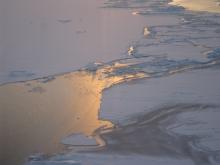
The Sea Ice Prediction Network (SIPN) announces a call for registration for an open webinar entitled "Uncertainty in Satellite-Derived Sea Ice Extent Estimates" presented by Walt Meier, NASA Goddard Space Flight Center. This webinar will focus on uncertainty in sea ice extent estimates from remotely-sensed data. Meier will discuss the current understanding of related issues and propose various methods of estimating extent uncertainty, with the aim of improving analyses of sea ice extent trends and variability. Time for participant questions will follow the presentation. This event is scheduled for Tuesday, 23 August 2016 from 10:00 a.m. to 11:00 a.m. AKDT.
SIPN Press
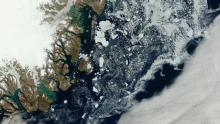
An article about SIPN, "Scientists Rally to Predict Arctic Sea Ice Melt" was published by journalist Hannah Hoag in Arctic Deeply.
PolarConnect Event: Chukchi Sea Borderland
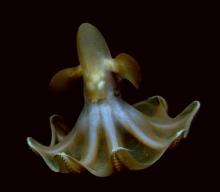
Join us for a PolarConnect event with teacher Sandra Thornton and the Chukchi Sea Borderland Research Team on Monday, 8 August 2016 at 2:00pm AKDT (3pm PDT, 4pm MDT, 5pm CDT, 6pm EDT). This event will be broadcast live from the US Coast Guard Cutter/Icebreaker Healy.
This is a real-time event with Virginia teacher Sandra Thornton and the researchers exploring marine communities from microbes to mammals and from sea ice to seafloor in this complex Arctic region. They will be sharing experiences and observations of their work aboard the Healy.
This event is hosted through the PolarTREC PolarConnect program, and participants will have a chance the learn from the scientists, ask questions, and chat with others during the presentation. Register today!
Sea Ice Outlook 2016
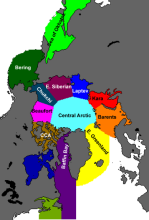
The Sea Ice Prediction Network (SIPN) announces the call for contributions for the 2016 Sea Ice Outlook August report; contributions are due Monday, 8 August. The Sea Ice Outlook provides an open process for those interested in Arctic sea ice to share ideas. The monthly reports contain a variety of perspectives—from advanced numerical models to qualitative perspectives from citizen scientists. Detailed guidelines for pan-Arctic, regional, and informal outlooks are available on the SIPN website.
TAC Make an Impact Workshop Essay

The Arctic in the Classroom (TAC) is a program created by ARCUS that partners scientists, educators, and communities to improve Arctic education. This four-year program educates K-12 teachers, students, communities, and others about the Arctic. Our goal is to identify best practices for how to administer both citizen science and community-based monitoring programs that are applicable for Arctic communities.
The Writer-in-Residence, Erica Watson wrote an essay about the "Make an Impact Workshop" that took place in March 2016, and it was published in The Arctic Institute.
2016 Sea Ice Outlook July Report Available
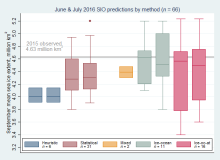
The July report for the 2016 Sea Ice Outlook (SIO) is now available! The goal of the SIO is to improve Arctic sea ice prediction on seasonal time-scales. Organizers thank all who contributed to the 37 Outlooks received for this report. The median pan-Arctic Outlook value for September 2016 sea ice extent is 4.3 million square kilometers. Contributions are based on a range of methods from advanced numerical models to qualitative perspectives from citizen scientists. The report includes discussion about dynamical model contributions and their variance, which has narrowed since the June report; discussion on predicted spatial fields, sea ice probability (SIP), and the first ice-free day (IFD) from a number of dynamical models; discussion on current conditions, recent atmospheric conditions, and probability forecasts for late summer meteorological conditions; key statements from each individual Outlook; and links to view or download individual contributions.
PolarConnect Event: Carbon Balance in a Warming and Drying Tundra
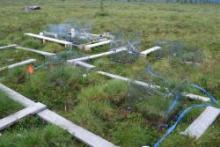
Join us for a PolarConnect Event with PolarTREC teacher Karen Temple-Beamish and the team studying Carbon Balance in a Warming and Drying Tundra on Thursday 11 August 2016 at 9:00-10:00am AKDT, 1:00-2:00pm EDT.
This is a real-time event with New Mexico teacher Karen Temple-Beamish and the researchers looking at the changes in carbon and how they effect the tundra. They will be sharing experiences and observations of their work in the Healy area near Denali National Park, Alaska. Read more about the research and what Karen is learning here: https://www.polartrec.com/expeditions/carbon-balance-in-warming-and-dry…
This event is hosted through the PolarTREC PolarConnect program, and participants will have a chance the learn from the scientists, ask questions, and chat with others during the presentation.
Arctic Scenarios Session at AGU
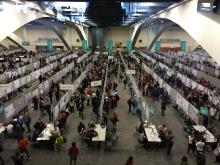
The conveners of an AGU 2016 Fall Meeting session on “Scenario Approaches to Understand Arctic Futures” invite you to submit an abstract. Consideration of alternative scenarios for the future of the Arctic can be a powerful approach to synthesize disparate trends and to understand the trajectories of Arctic change. Scenario approaches use a variety of scales of analysis to understand social-ecological systems, bringing together geoscience, biological science, and interactions of these natural systems with regional and global populations. Abstracts are invited that report on a broad array of Arctic scenarios efforts, or related efforts that could inform the use of scenarios for the Arctic. AGU abstracts are due Wednesday, 3 August.
SEARCH Arctic Alerts Panel Informs Washington Post Article

Featuring insights from the panel of researchers who participated in the SEARCH Arctic Alerts 2016 media roundtable, Chris Mooney's article covers this year's extreme Arctic environmental conditions for the Washington Post.
PolarConnect Event With SEARCH Scientist George Kling
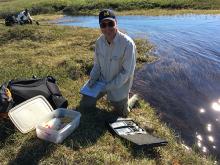
Dr. George Kling's field research on the Microbial Changes in Arctic Freshwater was recently featured in a PolarConnect event livestreamed from Alaska's Toolik Field Station. Joined by his colleagues Dr. Byron Crump and PolarTREC teacher DJ Kast, the event broadcast highlights the team's current efforts to understand how environmental change will impact the Arctic's microbial communities.
PolarTREC Live Event from Cherskiy, Russia
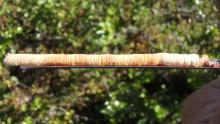
Connect to the the Russian Arctic! Join us for an upcoming PolarConnect event with Stanley Skotnicki and the Vegetation Impacts on Permafrost research team on Tuesday 12 July 2016 at 10:00am AKDT. This event will be broadcast live from Northeast Scientific Station in Cherskiy, Russia. Register today!
PolarTREC Live Event from Toolik Field Station, Alaska
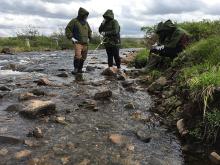
Connect to the the Arctic! Join us for an upcoming PolarConnect event with DJ Kast and the Microbial Changes in Arctic Freshwater team on Thursday 7 July 2016 at 1:00pm AKDT. This event will be broadcast live from Toolik Field Station in Alaska. Please join us! Register today!
Sea Ice Outlook 2016
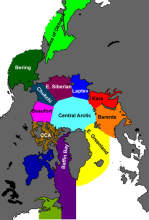
The Sea Ice Prediction Network (SIPN) announces the call for contributions for the 2016 Sea Ice Outlook July report; contributions are due Monday, 11 July. The Sea Ice Outlook provides an open process for those interested in Arctic sea ice to share ideas. The monthly reports contain a variety of perspectives—from advanced numerical models to qualitative perspectives from citizen scientists. Detailed guidelines for pan-Arctic, regional, and informal outlooks are available on the SIPN website.
2016 Sea Ice Outlook June Report Now Available
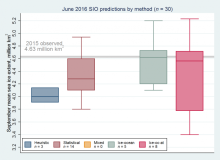
The June report for the 2016 Sea Ice Outlook (SIO) is now available! The goal of the SIO is to improve Arctic sea ice prediction on seasonal time-scales. Organizers thank the 32 groups that contributed Outlooks to this report. The median Outlook value for September 2016 sea ice extent is 4.28 million square kilometers. Contributions are based on a range of methods from advanced numerical models to qualitative perspectives from citizen scientists. The report includes discussion about dynamical model contributions and their variance, which is substantially less than last year; discussion on predicted spatial fields, sea ice probability (SIP), and the first ice-free day (IFD) from a number of dynamical models; discussion on current conditions including this spring's record low sea ice conditions, observations of sea ice thickness, and atmospheric conditions; key statements from each individual Outlook; and links to view or download individual contributions.
PolarTREC Live Event from Toolik Field Station, Alaska

Join PolarTREC during a live event from Toolik Field Station in Alaska.The event will be held on Thursday, 7 July 2016 with teacher DJ Kast and the Microbial Changes in Arctic Freshwater 2016 Team. Read more about their research and what DJ is learning here. The one hour event starts at 1:00PM Alaska Daylight Time (2pm PDT, 3pm MDT, 4pm CDT, 5pm EDT). The event is free.
Arctic Alerts 2016 Media Roundtable
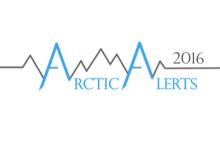
The Study of Environmental Arctic Change (SEARCH) announces ARCTIC ALERTS 2016, a media roundtable in which Arctic researchers will outline the unprecedented changes taking place in the Arctic environment and the local and global consequences. This year continues the recent trend of remarkable anomalies in the Arctic, and the presentations and discussion will focus on their connections to global changes.
The roundtable will take place at The National Press Club in Washington, DC on 13 July 2016 from 1-3 pm (EDT). Five brief presentations by scientific experts will be followed by questions from—and discussions with—journalists. In addition to the presenters, other scientific experts will be available to address journalists’ questions.
This roundtable is designed as a discussion between the researchers and journalists, so we won't be taking questions from the audience. Nonetheless, others are welcome to attend in listen-only mode. Please notify Brendan Kelly (bpkelly [at] alaska.edu) if you plan to attend so that we can accommodate everyone.
ARCUS Readership Survey
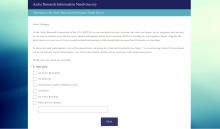
Help us serve you! ARCUS invites you to participate in a short survey on the kind of information on Arctic research you would like to get, in which formats, and with what frequency. The information from the survey will be used internally by ARCUS to improve our current communication channels. You also have the chance to win a cool Arctic umbrella! The survey will close 15 July 2016.
Witness the Arctic
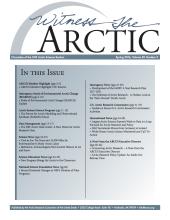
The Spring 2016 issue of Witness the Arctic is now published online. This issue includes highlights of ARCUS member institution UIC Science in Barrow, Alaska; SEARCH program activities of the three SEARCH Action Teams, the Sea Ice Prediction Network, the Sea Ice for Walrus Outlook, and the Arctic Observing Open Science Meeting; NSF funded projects and programs FAMOS and the new Arctic Data Center; news of key personnel changes in NSF’s Division of Polar Programs; spotlights on Arctic research efforts; interagency updates from IARPC, USARC, and SOAR; international news from IASC, a summary of 2016 ASSW events, and plans for the first-ever Arctic Science Ministerial meeting in Washington, D.C.; and comments from ARCUS Executive Director, Robert Rich.
New Arctic Soil Incubation Study Available
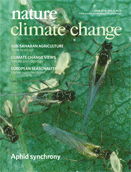
A new study led by Christina Schädel, SEARCH Permafrost Action Team co-lead, demonstrates the big impact that increasing temperatures and changes in soil moisture conditions have on carbon release. The report was published today in the journal Nature Climate Change.
SEARCH Leads Discuss 2016 Arctic Change Forecast in Washington Post Article

Learn more about the "uncharted territory" Arctic change researchers are facing this summer in this Washington Post article featuring SEARCH Action Team Leads, Jennifer Francis (Rutgers University) and Ted Schuur (Northern Arizona University).
PolarTREC Live Event from Kangerlussuaq, Greenland
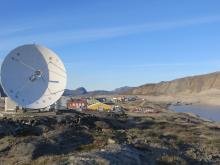
Join PolarTREC during a live event from Kangerlussuaq, Greenland. The event is on Thursday 16 June 2016 with teacher Anne Schoeffler and the Climate Change and Pollinators in the Arctic 2016 team. Read more about the research and what Anne is learning. The one hour event starts at 7:00AM Alaska Daylight Time [8AM PDT, 9AM MDT, 10AM CDT, 11AM EDT]. The event is free.
SEARCH Contribution to the Arctic Science Ministerial Meeting

The document provided below is meant to serve as background information for input by SEARCH to the Arctic Science Ministerial Meeting in September 2016. It builds on discussions among the research community and stakeholders at the Arctic Observing Summit and Arctic Science Summit Week in March 2016. The document also reflects input from the International Study of Arctic Change (ISAC) and from informal conversations with the leaders of large Arctic research programs in several countries. The document was reviewed by and received input from SEARCH leadership, and was assembled by the immediate past SEARCH SSC Chair and Director of the International Arctic Research Center at the University of Alaska Fairbanks, Hajo Eicken. The paper expands upon and complements the brief document submitted by the SEARCH program as input to the Arctic Science Ministerial. Over the course of the summer, it is hoped that further conversation among researchers from different countries active in Arctic science may help focus conversations and outcomes from the Science Ministerial.
Sea Ice Outlook 2016
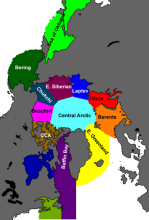
The Sea Ice Prediction Network (SIPN) announces the call for contributions for the 2016 Sea Ice Outlook June report based on May data. The Sea Ice Outlook provides an open process for those interested in Arctic sea ice to share ideas. The monthly reports contain a variety of perspectives—from advanced numerical models to qualitative perspectives from citizen scientists. Detailed guidelines for pan-Arctic and Alaska regional outlooks, as well as submitting figures and gridded data for other regional contributions, are available online.
The Arctic Calendar
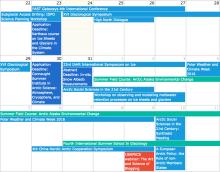
The Arctic Calendar is an online searchable calendar of conferences, lectures, webinars, and field trainings relevant to the Arctic science, education, and policy communities. The Arctic Calendar is a community resource for tracking and publicizing major Arctic events and conferences and to help avoid conflicting meeting dates. The calendar is maintained and hosted by the Arctic Research Consortium of the U.S. (ARCUS) in collaboration with the International Arctic Science Committee (IASC). We encourage anyone organizing a meeting to submit the event for inclusion on the calendar to maintain the calendar's usefulness as a communication and planning tool. We also welcome other Arctic organizations to link to the Arctic Calendar.
To submit events via the online form, please go to:
https://www.arcus.org/events/arctic-calendar/submit
PolarConnect Event with Teacher Kelly McCarthy
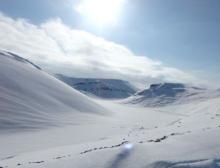
PolarConnect participants learned about what scientists are doing to study the polar regions, and what it is like to live and work in the Arctic and Antarctica through presentations and Q&A sessions with teachers and polar scientists.
Kelly and her team were stationed in Greenland for field work that involved flying over the ice sheets in the Arctic. She was at Thule, Greenland to connect with teachers and students around the country and share their experience. Learn more about Kelly and NASA's incredible expedition: https://www.polartrec.com/expeditions/operation-icebridge-arctic
This event was broadcast with the team from Thule, Greenland. It lasted one hour and was open to all ages.
